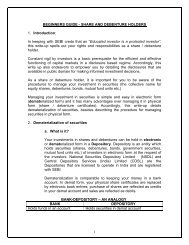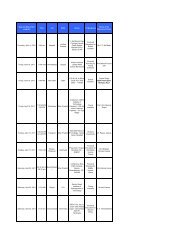financial planning 3. - Securities and Exchange Board of India
financial planning 3. - Securities and Exchange Board of India
financial planning 3. - Securities and Exchange Board of India
- No tags were found...
You also want an ePaper? Increase the reach of your titles
YUMPU automatically turns print PDFs into web optimized ePapers that Google loves.
11. Inflation effects on investmentsIf your investment portfolio includes a big portion <strong>of</strong> fixed income securities, you should payattention to inflation rates.Most susceptible to rising inflation rates are retirees that have fixed income. This is so sinceinflation decreases the purchasing power <strong>of</strong> money <strong>and</strong> retirees will be able to purchase lesswith their money than before.Inflation eats away your purchasing power. For instance, if the average rate <strong>of</strong> inflation is 8%,you need to make sure that your investments are earning a minimum <strong>of</strong> 8% or more, post-tax.Let us assume an investment portfolio <strong>of</strong> Rs 1,00,000, earning returns at 10% <strong>and</strong> inflation at8%. The returns in this case would be Rs 10,000 gross annually, with the net after income taxRs 7000 (Assuming you are in the highest tax bracket <strong>of</strong> 30%). Now, if you account for the 8%inflation specified (8000, or 8% <strong>of</strong> Rs 100,000), you are left with Rs (- ve) 1000 (Return <strong>of</strong> 7000minus inflation <strong>of</strong> 8000). It means you are not earning any money in real terms.12. Investment Comm<strong>and</strong>mentsHere are some Guidelines for you to follow.•••••••••••Do establish clear <strong>and</strong> reasonable investment goals before you invest.Do remember that there are risks in any investment. As potential pr<strong>of</strong>it increases, so doesrisk.Do diversify your investment portfolio to decrease your overall risk.Do select the appropriate asset mix <strong>of</strong> debt, equity, <strong>and</strong> cash equivalents.Do recognize the limits <strong>of</strong> your knowledge. Avoid investments you don’t underst<strong>and</strong>.Do your homework. Be sure you know what you are investing in <strong>and</strong> what impact it willhave on the risk, potential returns, <strong>and</strong> marketability <strong>of</strong> your portfolio.Do keep in mind that income-tax is payable on your investment while making investmentdecisions.Don’t invest on the basis <strong>of</strong> hot tips <strong>and</strong> rumours. They are seldom right.Don’t blindly follow investment advice that you don’t underst<strong>and</strong>.Don’t be afraid to say NO to the suggestions <strong>of</strong> your <strong>financial</strong> adviser if you are notconvinced the investments are right for you.Don’t take risks you can’t afford or aren’t comfortable with. Underst<strong>and</strong> your tolerance forrisk.Investment StrategiesDiversification aims to reduce the risks by investing money in a range <strong>of</strong> companies orproducts <strong>and</strong> by ensuring it is available at a different time; that is, not putting all your eggsin one basket. You may want to spread your money with several different institutions, withvarious investment types <strong>and</strong> across different markets, such as cash, fixed income securities,shares <strong>of</strong> companies or mutual funds.If you are investing in fixed interest investments, it may be wise to spread your money so thatyou have different maturity dates. This reduces some <strong>of</strong> the risk if interest rates change. It canalso provide you with income on a more regular basis. While you should always spread your17
















